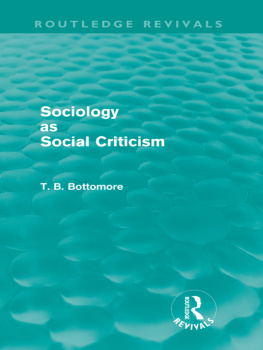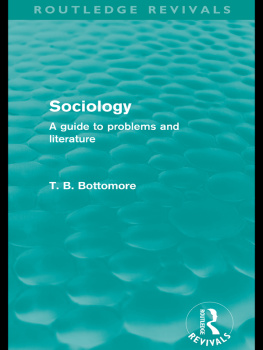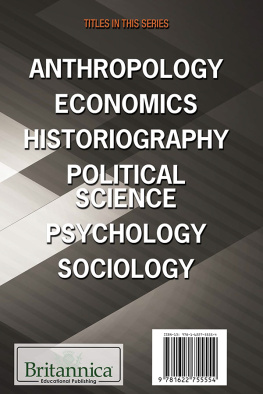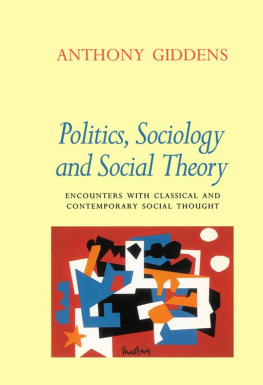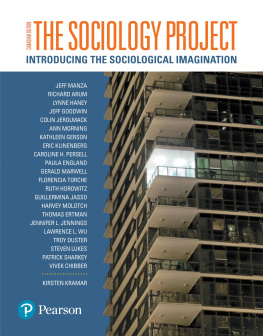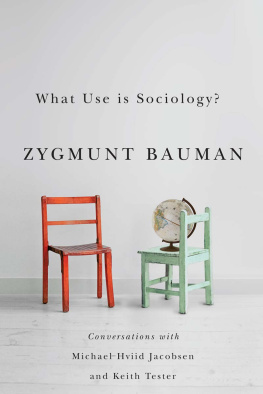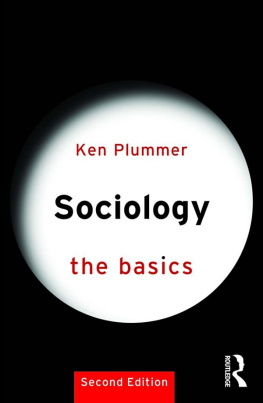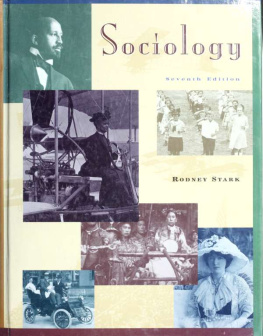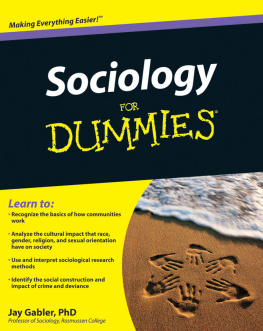Bottomore - Sociology As Social Criticism
Here you can read online Bottomore - Sociology As Social Criticism full text of the book (entire story) in english for free. Download pdf and epub, get meaning, cover and reviews about this ebook. City: London, year: 2010, publisher: Routledge, genre: Politics. Description of the work, (preface) as well as reviews are available. Best literature library LitArk.com created for fans of good reading and offers a wide selection of genres:
Romance novel
Science fiction
Adventure
Detective
Science
History
Home and family
Prose
Art
Politics
Computer
Non-fiction
Religion
Business
Children
Humor
Choose a favorite category and find really read worthwhile books. Enjoy immersion in the world of imagination, feel the emotions of the characters or learn something new for yourself, make an fascinating discovery.
Sociology As Social Criticism: summary, description and annotation
We offer to read an annotation, description, summary or preface (depends on what the author of the book "Sociology As Social Criticism" wrote himself). If you haven't found the necessary information about the book — write in the comments, we will try to find it.
Sociology As Social Criticism — read online for free the complete book (whole text) full work
Below is the text of the book, divided by pages. System saving the place of the last page read, allows you to conveniently read the book "Sociology As Social Criticism" online for free, without having to search again every time where you left off. Put a bookmark, and you can go to the page where you finished reading at any time.
Font size:
Interval:
Bookmark:

The pervasive presence of conservative and radical ideas in sociological thought, and the historically changing relationships between them, are at once obvious and difficult to interpret. One source of difficulty is the uncertain and variable meaning of conservative and radical. Some writers, perhaps, would still want to contrast bourgeois sociology (which is conservative) with Marxist theory (which is radical), but this view is no longer widely held. At the present time Marxism may serve in some societies to uphold a particular status quo and to inhibit criticism. Elsewhere, at least in its more orthodox forms, it may be seen as having lost some of its radical thrust, because it no longer bears upon the major conflicts and problems of the age and, by ignoring certain issues, has forfeited its liberating character.
Those writers who have doubts about the radical nature of Marxist thought in the late twentieth century have often attempted to define the conservative and radical tendencies in sociology in other ways; for example, by making a distinction such as that of C. Wright Mills between celebrating society as it is and criticising society, or by opposing, as Alain Touraine has done, a sociology of policy-making and a sociology of contestation. The trouble with such formulations is that they are, in general, less precise in their analysis of existing society, of the radical social forces at work in it, and of the goals of a radical movement, than Marx appeared to be in his account of capitalist society, the role of the working class, and the advent of socialism. But
If the radicalism of Marxism, in some of its principal versions, has been questioned, so too has the conservatism of sociology. In this case, also, there are conflicting interpretations of the development of thought. Sociology has often been described as the science of social crisis, and it emerged originally from the social and cultural crisis accompanying the decline of the ancien rgime and the rise of industrial capitalism. But this intellectual response can be viewed in two different ways. Sociology may be seen from one aspect as developing out of the critical social thought of the Enlightenment and eventually assuming a thoroughly radical form in the thought of Karl Marx. Or, on the contrary, it may be conceived as a reaction against the Enlightenment by the conservative thinkers of the early nineteenth century, whose ideas, greatly admired by Comte, entered profoundly into the constitution of his own sociological system.
Even if we were to accept one or other of these accounts it would still not be necessary to suppose that the orientation of sociological thought had remained quite unchanged over a period of nearly two centuries. Radical critics of sociology have often argued that the golden age of sociological thoughtthe period between the 1880s and the 1920s when Max Weber, Durkheim and Pareto were writing their major workshad pre-eminently the character of a conservative reaction against Marxism. It is undoubtedly the case that these thinkers were particularly concerned, in different contexts, to criticise the Marxist theory, and that they contributed important elements of a conservative theory of society. But the debate with Marxism in which they engaged itself helped to maintain a current of Marxist thought in sociology, and at certain times (as in the 1930s and the 1960s) there was a revival of radical thought which drew to a large extent upon Marxist ideas.
There is, however, a more thoroughgoing critique of the conservative orientation of sociology, which denies altogether the radicalism of Enlightenment thought in the form which it assumed in sociology, and which questions those elements of Marxs theory that were derived from the same source. This critique, undertaken mainly by the Frankfurt School, and especially by Max Horkheimer, sees the scientific rationalism of the Enlightenment as embodying a conception of nature as an object for human manipulation and control which led necessarily to a similar view of man himself, in his social relationships, as an object of domination.
From this standpoint the whole early development of sociologywhether it is the intellectual contributions of the conservative romantics, or those of the Enlightenment thinkers, that are
These arguments bring to light another aspect of the development and orientation of sociological thought. There is on one side an inner connection of ideas which, according to how it is interpreted, reveals the tendency of a particular sociological out-look to reinforce or oppose an existing form of social life. On the other side, sociological thought derives its preoccupations and some part at least of its general framework of presuppositions, its criteria of what is significant or valid, from the form of society in which it is carried on. As Robert Lynd once observed: Social science is not a scholarly arcanum, but an organised part of the culture which exists to help man in continually understanding and rebuilding his culture. Lynd emphasised the rebuilding of the culture, and advocated a more critical social science which would show the way to a radical transformation of American society in the decade of the depression. But sociology as a part of the culture cannot easily escape the influence of what is dominant in a given culture; and it is in those periods when there is manifest conflict and contestation in society itself that, in the first place, the distinction between a conservative and a radical sociology is sharply delineated, and secondly, a radical sociology assumes a growing importance in the whole field of social thought.
Only to the extent that modern societies are not harmonious wholes, that conflicts between major social groupings exist within them, can a radical sociology be constituted and continually recreated. The depiction of the whole post-Enlightenment period as a bourgeois epoch, in which only bourgeois social thought, in however many different guises, could flourish, ignores the extent of the oppositions in modern societies, on the basis of which Marxism itself developed. It is in fact the apparent decline of such opposing forces, especially as they were manifested in the conflicts between clearly demarcated classes, that has led to new conceptions of modern society as industrial society or scientific-technological society; but the notion of a general pacification of social life, of the emergence of a consensus in the conditions of democracy and affluence, has not survived the radical upheavals of the 1960s.
Yet it would be a mistake, in my view, to give an exclusive importance to this aspect, and to represent sociological thought as the mere reflection of a particular balance of social interests. Within a given system of social relations and cultural norms there remains a sphere in which the relatively autonomous intellectual development of sociology is possible. If this is so then we can ask what the tendency of this development has been and is likely to be; whether it sustains or brings into question the established form of life. Two features of sociological thought seem to me to justify speaking of an inherently radical orientation. In the first place, I would emphasise as the principal legacy of the Enlightenment in sociological thought, and in Marxism as one of its forms, the critical outlook of science, rather than the idea of the domination of nature and its extension to social practice in the domination of men. It is one of the positive, and radical, features of sociology considered as a science that it involves a continuous criticism of all extant theories of society, including those everyday conceptions of the social world which shape practical life. At present, the general unease about the social consequences of advanced science and technology gives some encouragement, and justification, to the critics of scientific rationalism, but I cannot see that the cause of human liberation will be greatly helped by forsaking this for the religious mysticism that grows so luxuriantly among the exponents of a non-scientific counter culture.
Font size:
Interval:
Bookmark:
Similar books «Sociology As Social Criticism»
Look at similar books to Sociology As Social Criticism. We have selected literature similar in name and meaning in the hope of providing readers with more options to find new, interesting, not yet read works.
Discussion, reviews of the book Sociology As Social Criticism and just readers' own opinions. Leave your comments, write what you think about the work, its meaning or the main characters. Specify what exactly you liked and what you didn't like, and why you think so.

